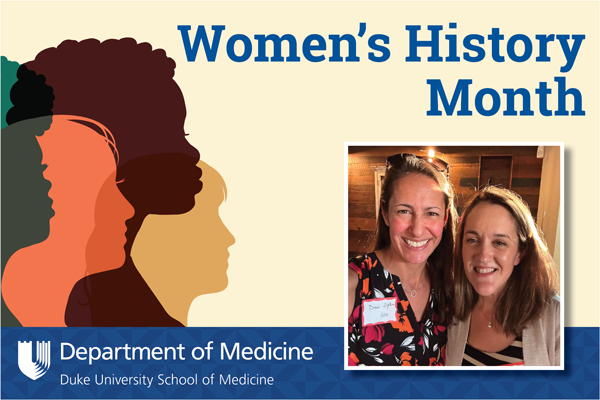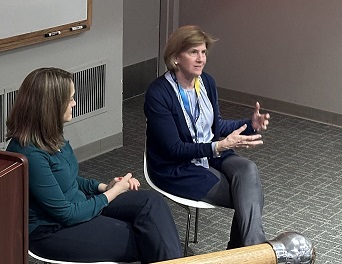
The Program for Women in Internal Medicine (PWIM), led by Chair Dr. Daniella Zipkin and Dr. Jennifer Rymer, trainee liaison, is broadening the conversation around equity in the Duke University Department of Medicine (DOM).
Having the space to elevate topics that impact women, holding events that take on the topic of inequity for women and people of color, and creating platforms for authentic discussion at a department level has been ground breaking for Zipkin, associate vice chair for Diversity, Equity & Inclusion.
“Under Dr. Kathy Cooney's leadership, we've been able to take these conversations further than I had imagined,” she said, pointing to a pinnacle moment last fall when a joint PWIM-neurology town hall addressed the topic of promotions at Duke.
The event brought together a panel comprised of DOM division chiefs and representatives from the Faculty Appointments, Promotion and Tenure Office for an enriching and educational discussion.
Key Inflection Points
“Our women faculty learned a lot about key inflection points in the process and how they affect them, and we debated the expectations of academic progress on balance with what women really want out of their careers,” she said. “And we also had women faculty on the panel who spoke out directly about the barriers they face.”
PWIM is guided by principles of diversity and equity and aims to support, unite, inspire, and empower women faculty and trainees to achieve their highest potential in scholarship, leadership, and well-being through networking and community, scholarship and leadership, and equity and advocacy.
Zipkin wants to further broaden the conversation around issues pertinent to careers in academic medicine such as obtaining the resources they need to move toward promotion, administrative and research grant support, office space, mentoring recognition and clinical opportunities. More events, she added, tracks with a need to bring more male leadership voices to the conversation.
“They need to know how involved they are at such inflection points which can slow women's career progress,” she said. “We can demonstrate that women statistically have less procedural time than their male counterparts, for instance. Why is that happening? It's hard to know but all of these things lead to lower promotion rates.”
Toward this end, PWIM is launching a Conversation Series on March 12. Dr. Toyosi Onwuemene, associate professor in the division of Hematology, will be the inaugural guest, highlighting the move from clinical to research careers. Dr. Onwuemene has spoken nationally on topics of importance to women faculty, and all faculty, in academic medicine.
Quiet Advocacy
Another monumental moment for PWIM springs from something that's actually quite small but has a high impact: quiet advocacy.
“What I've discovered in this role is the vast opportunities for what I have started to call quiet advocacy, or maneuvering and helping women strategize when they are in sticky situations regarding their work environments, clinical and research teams.
“I have had multiple one-on-ones with women across all the divisions around the situations that they're facing,” she said. “I love being able to support them and to help them strategize in which direction to maneuver themselves. It's probably the most gratifying thing, and that's all completely invisible.
Clarity around policies is another area that Zipkin wants to take on following the DHIP integration. The policy landscape was already complicated and has become a lot more complicated for things like family leave and a whole variety of other things affecting women, she added. “I get a lot of requests for help with that.”
Inclusion for All

Elevating the issues that women face to the entire DOM community has been a focus for Dr. Rymer, who emphasizes inclusion for all in the department, including men. In her PWIM role, she develops and executes programming focused on trainees along with seminars and networking events such as the seminar series Before They Were Stars. Dean Mary Klotman was a recent guest, discussing her career roadmap to success.
Such events benefit members by fostering dialogues with successful women leaders at Duke, what their career paths have been, how they trailblaze, and obstacles they've had to overcome.
“It's an opportunity for the trainees, and early career faculty in particular, to learn from someone who has been so accomplished, and maybe learn from their mistakes and what their advice is,” said Rymer, a cardiologist who also serves as an early career mentor for the group. “Hopefully, they take away some points they can utilize in their own careers in terms of leadership positions, troubleshooting or obstacles that they may face in careers and medicine.”